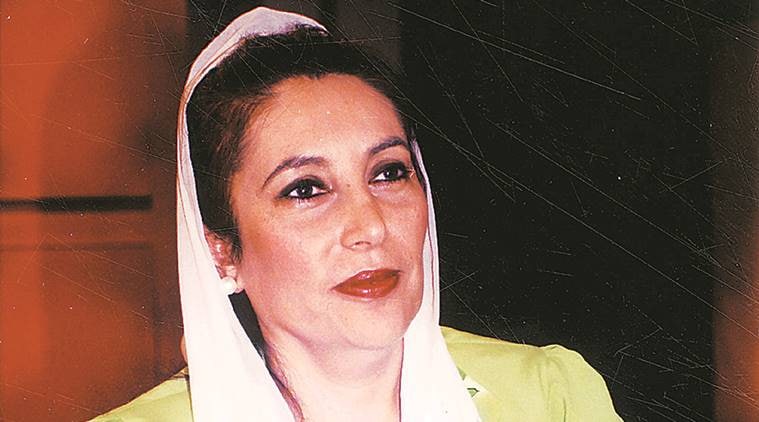Revisiting Benazir
A new biography looks back at the time when charisma reigned, as did corruption

Former Pakistan prime minister Benazir Bhutto. (Express archive photo)
Syeda Abida Hussain, a well-known Pakistani politician from Jhang in Punjab, first wrote her autobiography Power Failure: The Political Odyssey of a Pakistani Woman (OUP, 2015), describing her intimacy with Benazir Bhutto, an ex-prime minister assassinated in Rawalpindi in 2007. In fact, she was with Benazir in Karachi when the first attempt on the latter’s life was made and was wounded by the exploding suicide-bomber. Now she has written a biography of her leader and the book is so revealing that the Bhutto clan has gone to court against it.
Special Star: Benazir Bhutto’s Story (OUP, 2017) is full of negative observations narrating once again why charisma hides corruption in Pakistan for a time but proves a flimsy cover in the final reckoning. The author obviously refused to see what BB was all about when she joined her. But the book belies this: She always knew what was happening when BB and Zardari ruled in Islamabad but joined her because of political compulsions. She says: “In the beginning I was one of Benazir Bhutto’s detractors. I thought she was incompetent and not above board. Gradually, I understood her better, obtaining a measure of her suffering, which led to my being friends with her.”
Hussain goes over the painful period of BB’s life after her father Prime Minister Zulfikar Bhutto was hanged by General Zia and she was sent to prison for two years where she felt stomach pain and was operated upon — only to get the pain again. Released, she rejoined her mother but under house arrest. Her rage was muffled but it came out much later when she was freed and facing a cheering crowd: “I will kill Zia ul-Haq and cover my shoes with his skin!” Victoria Schofield, her Oxford friend, wrote in Bhutto: Trial and Execution (1979).
In power in 1988, BB didn’t do well partly because the army was breathing down her neck. She took some “singularly poor” decisions: “In granting amnesty to all political prisoners, she secured the release of thousands of common criminals, which did not help the maintenance of law and order. By ordering a liberal number of automatic weapons to be issued, she consolidated the gun culture introduced during the Zia years. She announced the launch of a People’s Works Programme which led to excesses and waste of resources throughout Pakistan. Most of her ministers were allegedly resorting to corrupt practices, and her husband was accused of having a substantial appetite for commissions. He became known as ‘Mr Ten Percent’. ”
BB tried to be pragmatic and to be on the right side of General Aslam Beg, the army chief, but “her minister for defence, Colonel Sarwar Cheema, did not help with the equation and incurred the hostility of the army chief”. BB was not good herself at taking sane advice as she ignored Hassan Zaheer, her principal secretary and author of a tell-all book on the dismemberment of East Pakistan. And BB misused the official aircraft to ferry her children to Karachi repeatedly for an ice-cream.
Then this revelation which confirms what people came to know of BB later: “Benazir was very superstitious, placing faith in amulets and soothsayers. When she visited Bangladesh she was told about a soothsayer and sent specially for him. She was closeted with him or over an hour despite her very tight schedule.”
By the time BB comes round to making her next government in 1993, the biography lists a series of “projects” undertaken by Zardari. This includes the bit about Zardari, “with fifty stables constructed for his horses on the prime minister’s estate and a polo field”, presenting PPP’s own leader in the presidency, Farouk Leghari, with compromising snaps of his daughter with the message “with compliments from Benazir Bhutto”. This climaxed in President Leghari finally dismissing her government under Article 58/2/B. Hussain relates she objected to BB appointing Hina Rabbani Khar as the party’s representative from Muzaffargarh because she was the daughter-in-law of the sister of Ambassador Wajid Shamsul Hassan, a Bhutto loyalist.
The case against the book is proceeding at the usual pace. And Hussain is looking once again for a worthy leader to support.
The writer is consulting editor, Newsweek Pakistan
For all the latest Opinion News, download Indian Express App
More From Khaled Ahmed
- Diplomat who made friendsAmbassador Marker helmed Pakistan’s embassies at a tough time in its history...
- Ideology vs StateWrangling politicians of Pakistan call themselves ‘ideological’. What could they mean? ..
- Remembering Charanjit SinghCharanjit Singh was killed by those fed on an ideology that demonises non-Muslims in Pakistan ..








































No hay comentarios:
Publicar un comentario